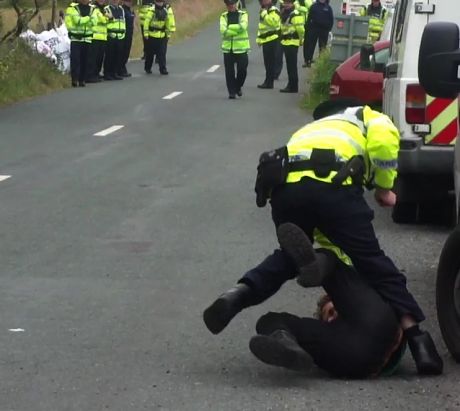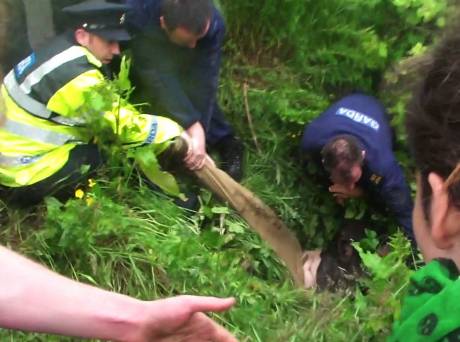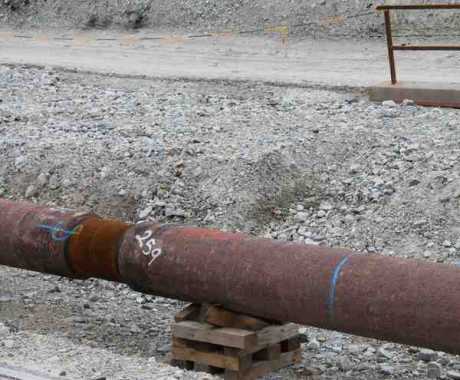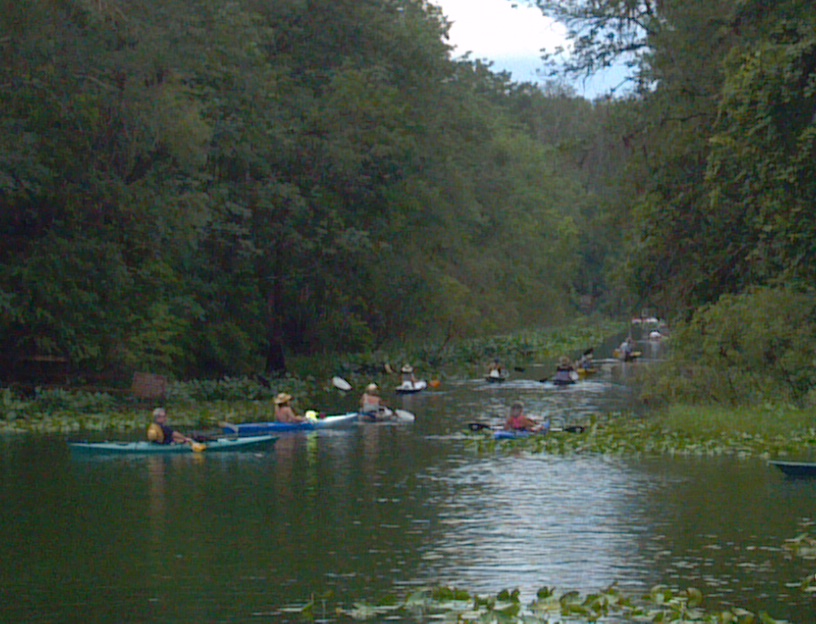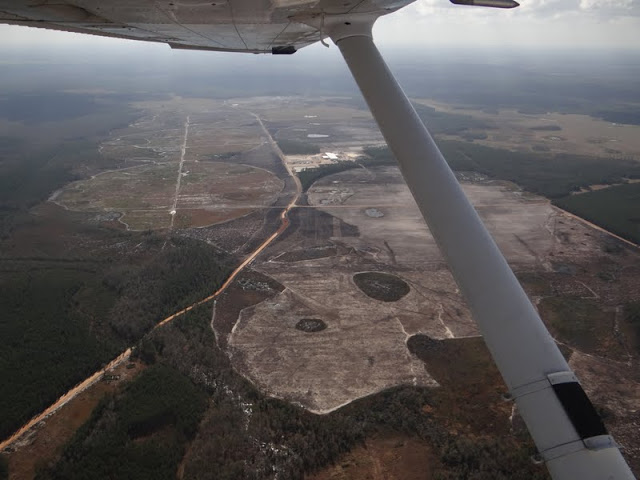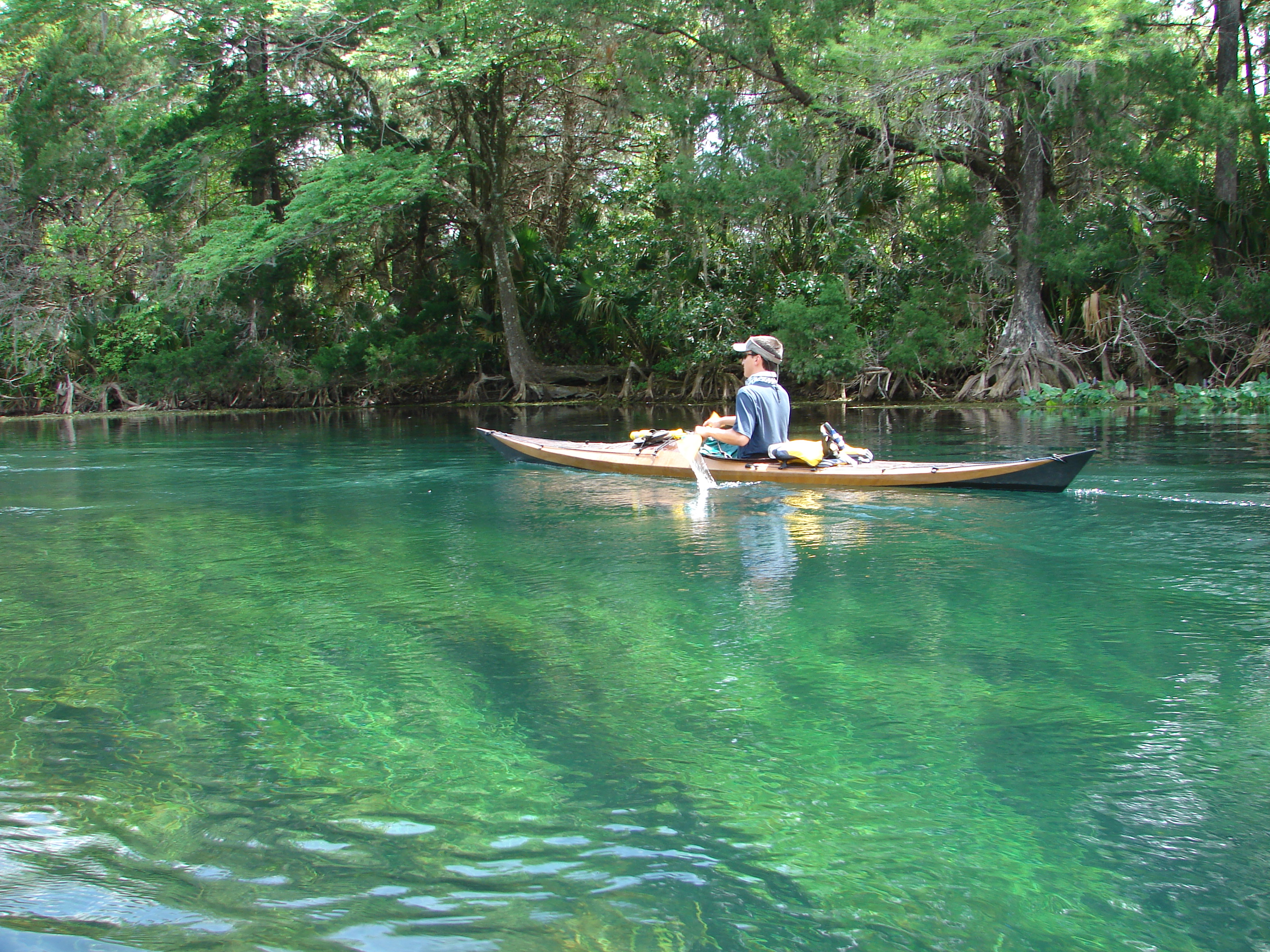25 June 2013 The first direct actions of the Erris struggle against Shell took place 8 years ago when 6 locals were injuncted and then 5 of them jailed for refusing to allow Shell onto their lands. In the 8 years that have passed there have been countless direct actions, dozens of arrests, about two dozen jailings and hundreds of people attacked by Garda or Shell's security company IR
25 June 2013 The first direct actions of the Erris struggle against Shell took place 8 years ago when 6 locals were injuncted and then 5 of them jailed for refusing to allow Shell onto their lands. In the 8 years that have passed there have been countless direct actions, dozens of arrests, about two dozen jailings and hundreds of people attacked by Garda or Shell's security company IRMS. But as the first two days of the week of action demonstrated that intense level of repression over so many years has yet to end effective resistance.
The cost to the local community has however been enormous. Some people who would otherwise never have had an encounter with the law have spent at least time in jail. Others have been beaten up by the Garda, some left with permanent injuries. And everyone has to endure the constant surveillance of everyone who passes Shell's compounds which are now scatted across the area. At key moments they have also had to live in communities that were under occupation as hundreds of Garda have been deployed along with the gun boats of the Irish navy. Alongside this are the even darker experiences of campaigners being attacked in the night, in one case having a fishing boat sunk under them and the all too common stories of people who realised their homes and family were being spied on by unidentified men.
Despite this there were a constant stream of people from the local community visiting the camp and the social activities arranged over the weekend along with a few who, 8 years on, are still determined to take part in and indeed lead direct actions against, around and within the compound. At this stage in the long struggle its true that a much larger burden of organising and risking beatings and arrest in such actions has fallen on the shoulders of those travelling to Erris to stand alongside the local communities. Very few ordinary people could sustain the level of resistance of 2005 – 2007 over the years that followed, indeed the Rossport Solidarity Camp itself has seen a complete change in personnel at least twice now.
These changes have meant that the focus and methods of the campaign have shifted in emphasis over time. Initially the dangers of Shell's plan to run an experimental high pressure gas pipeline through the gardens of peoples house, literally under their driveways, was the key focus for many with massive mobilisations of virtually the entire local community. As the media ran a highly successful smear campaign against the community the issue of the huge giveaway of Irish Oil and Gas became central. A huge campaign to inform the public of the robbery that was going on under their noses was conducted, over 120,000 copies of a 4 page booklet on the giveaway were distributed and an intense media campaign conducted. The led to many people across the island realising that the struggles of a small community far away in Mayo was also their struggle because every cent of profit Shell would take would be a cent less funding for education and heathcare.
The campaign built links with similar struggles elsewhere and this meant that over time people also started to come to Erris from outside Ireland to stand in solidarity with the community. This pushed the global question of fossil fuel usage within the campaign and led to quite a few discussions as a balance was sought between fighting for real taxation on what was extracted and saying that our use of fossil fuels was a collective insanity that was leading the planet to environmental catastrophe. In terms of tactics we also saw a shift from the mass blockades involving hundreds of local people and their supporters to more specialised small group actions around lock ins and using tripods allowing small groups of people block roads for a long period of time. That shift was in part determined by the use of violence by the Garda to clear roads under their 'no arrest' policy, a violence that was nearly always reported by a compliant media as if it had originated with the campaign. You can just about get away with this when video footage shows lines of Garda batoning people standing on the road but it doesn't really look very convincing when people are sitting on the road with their arms trapped in steel pipes or dangling in mid air high above the roads surface.
All these strategies have forced the Irish state to back down on simply forcing Shell's original pipeline plan through and instead insist on significant changes in the safety of the project. Between such changes and the huge delays caused by the countless direct actions Shell's costs have soared from the initial estimate of 600 million to well over 3 billion. Top Shell personnel in Ireland have regularly been replaced as each in turn has failed to push through the project on time, the current estimated completion date is about a decade after the one intended. The government has been forced to introduce changes in the amount future energy finds will be taxed.
None of these changes fix the problems with the project,
- the experimental pipeline is still too close to people's houses and running through an area that suffers huge landslides,
- the tax take on the project is still low and because of the way Shell is allowed write off expense it is probable that not a cent in tax will ever be collected,
- the location of the refinery threatens both the water supply of the area and the pristine environmental conditions that make it attractive to tourists and a sought after source for fish and shell fish,
- the countless abuses of human rights that have forced the project this far will never be erased from the lives and minds of those who were jailed, beaten or spied upon.
But none of this should stop us acknowledging the huge defeats that resistance has inflicted on Shell and the significant if incomplete gains that have been won.
This is the context of the current week of action which is happening in what Shell must hope is the final phase of their construction project. The refinery is complete and most of the pipeline laid. They got the Tunnel Boring Machine into the compound and it's now at work under the estuary. Although their are constant rumours of problems being encountered and the sudden appearance of deep and life threatening sinkholes on the surface must indicate unintended subsidence into and around the tunnel beneath.
Shell and the Irish state though their intensive repression of the local community over 8 years must have hoped that active resistance was almost over. That the prolonged period of jailing and brutalisation they had subjected people to had sapped their will to continue to resist as they needed to get on with the normal routines of working and bringing up families that people elsewhere in Ireland can take for granted. So the fury of the assaults on the compound over the last couple of days must have been a major disappointment for them, the quantity of damage the direct actions resulted in is probably comparable to that inflicted at the height of any earlier point in the campaign. Not only was several days work destroyed but many of the compounds spy cameras were wrecked and equipment essential to doing that work again put out of action. It must also have become clear that the fortifications erected for this stage of the project are inadequate when faced with a few dozen determined people and that they cannot that those numbers cannot be mobilised.
In a better world this struggle would have been won in 2005 when the determined mobilisations of the community should have resulted in the national outcry that would have driven Shell to Sea (the off shore refinery option which now would have saved Shell both time and money). Or it should have been won in 2007 when thousands of people from all over the country mobilised to block the roads and face the baton charges of the Garda. But, with no small thanks to a media that was in one part cowardly to two parts being in the pockets of energy corporations, that outcry never emerged. The state risked and got away with brutalising protesters and engaging a long term strategy of trying to sow divisions in the community on the one hand and intimidating, beating and jailing those who continued to resist on the other.
What maintained the struggle at an intense level was solidarity. The solidarity of those who travelled from all over Ireland to stand with the community. And the solidarity of those who came from further afield, in particular the UK. This is not a trivial thing, people from far away have spent formative years of their lives in this small corner of north west Mayo fighting for people and a place with whom there only initial connection was a shared sense of resistance and a struggle for environmental justice. There have been different phases in the struggle, some of these phases have probably ended but the struggle against Shell in Erris and what the energy corporations are doing to this planet goes on.
Rossport has become a byword for determined resistance across Europe and beyond. Books have been written, films made, babies born and we have had the sadness of friends and comrades in the struggle dying. Thousands, perhaps tens of thousands have visited the area and stood alongside the community. Many brought lessons from elsewhere to this resistance and many have returned with lessons from this resistance to other struggles. In that sense the struggle has become much more than the individual issues it is composed of, it has become a significant part of the new world the people across the globe are building in their hearts. In that sense it is a struggle that will never end but will be remembered and carried forward long after the refinery is dismantled and the pipes have rusted in the ground.
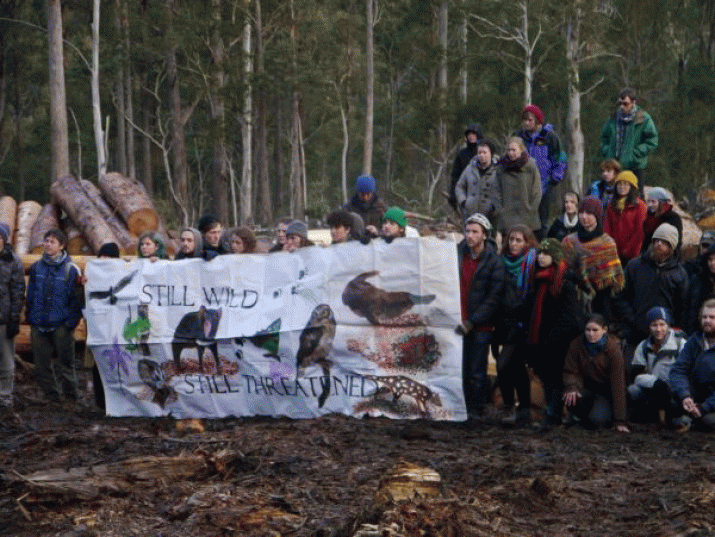 13 July 2013 Activists have vowed to continue to target timber processor Ta Ann Tasmania, after two people were arrested for chaining themselves to equipment at its Smithton mill yesterday.
13 July 2013 Activists have vowed to continue to target timber processor Ta Ann Tasmania, after two people were arrested for chaining themselves to equipment at its Smithton mill yesterday.


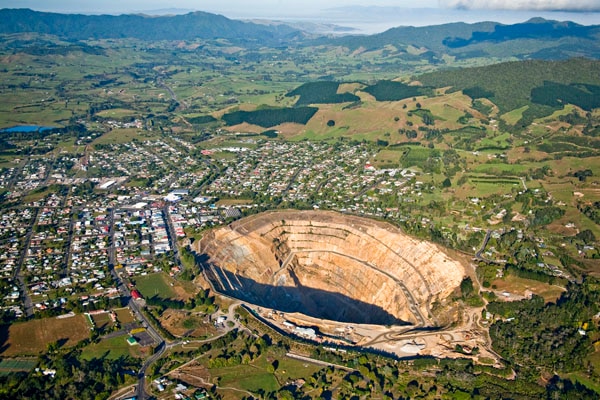

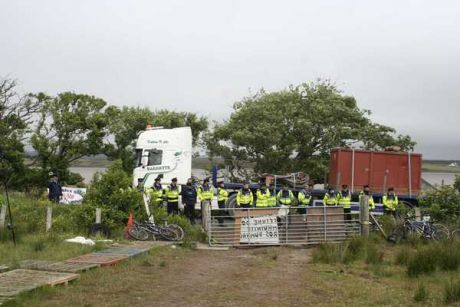 30 June 2013 This week has seen large numbers of people continually walking down to Shell's tunneling compound, disrupting work and blocking Shell traffic, and man
30 June 2013 This week has seen large numbers of people continually walking down to Shell's tunneling compound, disrupting work and blocking Shell traffic, and man 30 June 2013 This week has seen large numbers of people continually walking down to Shell's tunneling compound, disrupting work and blocking Shell traffic, and many people from the camp have taken advantage of the sunny weather to spend the days helping locals with turf collecting- many hands make light work! Meanwhile the guards have spent their time patrolling around harassing people on the roads.
30 June 2013 This week has seen large numbers of people continually walking down to Shell's tunneling compound, disrupting work and blocking Shell traffic, and many people from the camp have taken advantage of the sunny weather to spend the days helping locals with turf collecting- many hands make light work! Meanwhile the guards have spent their time patrolling around harassing people on the roads.